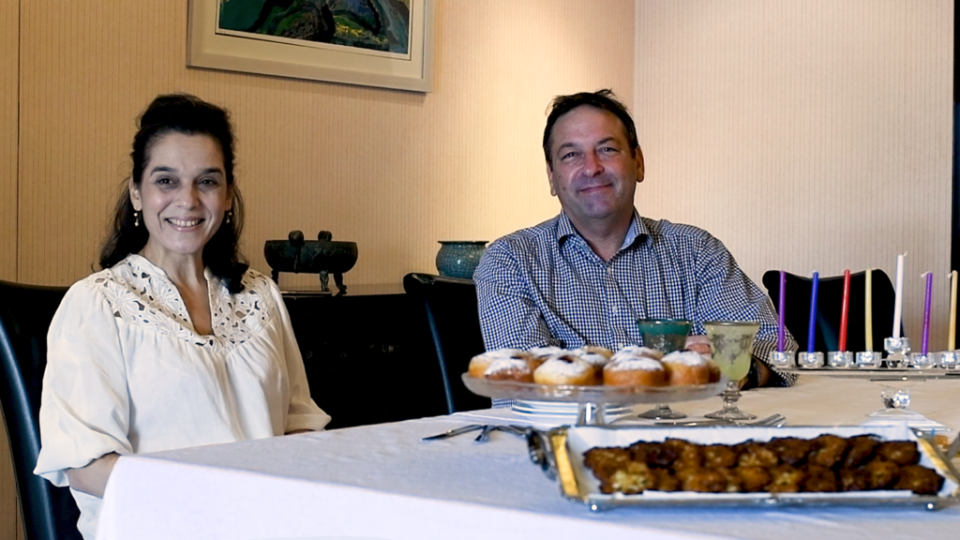台灣的猶太家庭在台歡慶「光明節」
【看CP學英文】台灣的猶太家庭於上週慶祝哈努卡節「Hanukkah」,節慶中包含點燃光明燭台、分享美食以及與家人參與各種宗教儀式。
The members and friends of the Jewish community in Taiwan recently celebrated Hanukkah, meaning lighting menorahs, sharing delicious recipes, and participating in various (religious) activities with their loved ones.
又稱「光明節」,哈努卡為紀念在西元前二世紀時,猶太人收復聖地耶路撒冷及隨後猶太城邦馬家比反抗希臘塞琉古帝國(馬其頓帝國分裂後的希臘帝國)後重新供奉第二聖殿的事蹟。
Also known as the “Festival of Lights,” Hanukkah commemorates the recovery of Jerusalem and subsequent rededication of the Second Temple at the beginning of the Maccabees revolt against the Seleucid Empire (a Greek kingdom resulting from the division of the Macedonian Empire) in the 2nd century BCE.
在每年11月底到12月初連續八天間,人們藉由點燃有著九個分支、亦稱「hanukkiah」的燭台來慶祝光明節。
Hanukkah is observed for eight nights and days between late November to late December in the Gregorian calendar by lighting the candles of a “menorah” or “hanukkiah” – a candelabrum with nine branches.
蠟燭每天晚上(一天一支)會被位在中間的蠟燭 (Shammash)點燃,直到在光明節最後點燃所有蠟燭為止。
The candles are lit each night (one per day) by the “shammash” (the candle sitting in the middle of the menorah) until all eight candles are lit together on the final night of the festival.
以色列代表Omer Caspi告訴The China Post,「這就是光明節的主要儀式。」「佳節期間,我們每晚都會做一樣的事,我們向燭台祈福,我們也視這種儀式為一種保佑。」
“This is the major ceremony of the festival,” Israeli Representative Omer Caspi told The China Post. “It happens every night, we bless over the candles, and we light it as a blessing.”
他說道,「我們會在每個家庭及公開儀式做一樣的事」。
“We do it in every household as well as in public ceremonies,” he said.

「我們也把Hanukkah稱作『光明節』」Galit Cohen Caspi補充道。她也強調,根據傳統,不論哪種光明燭台,它們都會被擺在大家都看得到的位置,像是在窗台邊,這樣經過屋子的人都可以看到燭光。
“We also call Hanukkah the “Festival of Lights,” Galit Cohen Caspi added, stressing that, according to traditions, the “hanukkiah” or the “menorah” are placed where “everybody can see them, at windows, so all the people that pass can see all the lights in all the houses.”
她解釋道,其他光明節的活動包含唱佳節歌曲、玩光明陀螺以及吃很油的食物,像是馬鈴薯餅 (levivot) 、光明節甜甜圈 (sufganiot) 以及其他乳製品等。
Other Hanukkah festivities include singing Hanukkah songs, playing the game of dreidel and eating oil-based foods, such as “levivots” (latkes) and “sufganiot” (Hanukkah doughnuts), and dairy foods, she explained.
她繼續說道,「光明節是個非常闔家的節日,我們在這八天的傍晚都會齊聚一堂,不論是跟朋友、家人和小孩或是親近的摯友」。
“Hanukkah is a very, very much holiday of the family,” she continued. “We gather every night during these eight evenings, we gather together with friends and family with kids with close family and friends.”
「我們會吃光明節甜甜圈和馬鈴薯餅因為他們象徵「油」,也就是那罐持續點燃八天的油所帶來的奇蹟。」她繼續說道,「所以吃很多很油的食物變成了傳統習俗之一。」
“We eat ‘sufganiot’ and ‘levivot’ as they symbolize the oil, the miracle of the oil, the can of oil that lasted for eight days,” she continued. “So, the tradition says: you have to eat a lot of oily food.”
「孩子們通常會玩光明節陀螺,他們會旋轉陀螺,而陀螺有四面分別寫著“nes gadól hayá po” (נֵס גָּדוֹל הָיָה פֹּה)的字樣,代表『這裡曾發生過奇蹟』。」
“The kids normally spin the dreidel. The dreidels have four letters which say, “nes gadól hayá po” (נֵס גָּדוֹל הָיָה פֹּה), which means a “big miracle happened here,” she added.

她說道,「然後我們會給孩子光明節禮物,是一種光明節的零用錢。對孩子們來說,這是從歐洲猶太人流傳下來的傳統。」
“And then we give to the kids the “dmei ḥanukah,” it’s Hanukkah pocket money,” she noted. “For the kids, it’s a tradition that came back from the Jewish in Europe.”
根據猶太曆法,Caspi認為光明節應該是最受小孩喜愛的節日之一,在以色列,學校通常都會放假讓學生可以回家過節。
According to the Jewish calendar, Caspi remarked that Hanukkah is probably the beloved holiday especially by kids. In Israel, the schools are closed by the way during the Hanukkah week, and the kids are at home.
當被問到台灣的猶太群體時,Omer評論道,以色列群體相對偏小,尤其是在疫情期間,航班相對難訂且人們不再像以前一樣旅行。
Asked about the Jewish community in Taiwan, the representative remarked that Israeli community is relatively small, especially during COVID, when flights are difficult, and people do not travel as it used to be.
然而他評論道,現在以色列和台灣皆對彼此的文化越來越感興趣,「台灣和以色列之間有很多相似的地方。」
Still, he remarked that there is a growing interest among the people in Taiwan and Israel for each other’s culture. “There are many similarities between Taiwanese and the Israelis,” he noted.
「兩地的人都有很悠久的傳統與豐富的文化遺產,我想兩邊的人民,一來有非常現代化、新穎及高科技的社會,但同時對於傳統也是非常講究。」
“Both peoples have long, very long tradition and heritage,” he went on. “I think both peoples, in one hand they are very modernized, up to date, technology-based societies, but at the same time, tradition is very important.
他表示,「兩地的人們也都非常重視家庭。台灣當地的節日和以色列一樣都是和家人一同慶祝的。」
“Family values are also very important for both sides,” he concluded. “Local holidays here are being celebrated around the family table, the same as in Israel.”

 Yahoo奇摩新聞
Yahoo奇摩新聞 